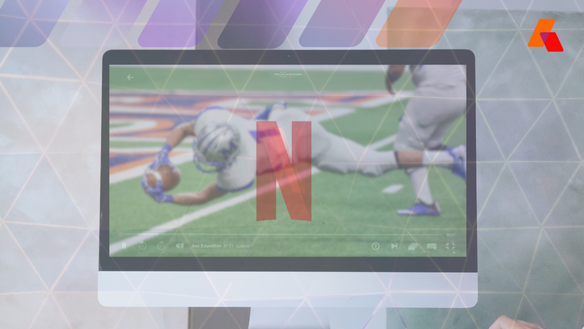Netflix Wins Big on NFL Christmas Gameday

The Kansas City Chiefs and Baltimore Ravens delivered decisive wins on the field during Netflix’s first-ever NFL Christmas Gameday. But the real winners extended far beyond the football field. Netflix emerged triumphant in its battle to prove it could compete in live sports streaming, while Beyoncé elevated the day into a cultural event with her show-stopping halftime performance. Together, they turned Netflix’s NFL Christmas Gameday into a case study for success in the ongoing war to monetize content.
The War to Monetize Content
Streaming platforms are locked in fierce competition to dominate the future of TV, which means applying technology, data, and advertising formats to meet the demands of a fragmented and rapidly evolving media landscape. Combining subscription models with ad-supported tiers is essential to monetizing content (one of the major trends shaping the media landscape in 2025), with live sports as a key weapon in their arsenal. With billions of dollars at stake, services like Netflix, Amazon, Peacock, and YouTube are competing to attract viewers and advertisers.

For Netflix, hosting NFL games marks a significant shift. Traditionally known for its on-demand programming, the company has entered the live sports linear streaming arena, where events promise both massive audiences and lucrative ad deals. Live sports also serves as a critical differentiator in the streaming wars, offering content that’s hard to replicate and nearly impossible to skip – delivering premium inventory for advertisers. This context explains why Netflix committed heavily to its NFL debut.
The Stakes for Netflix
NFL Christmas Gameday marked the first time Netflix had hosted an NFL game even though competitors such as Amazon, Peacock, and YouTube were already doing so. Playing catch-up, Netflix decided to go big by hosting not one but two NFL games on Christmas Day. And on top of that, Netflix announced it would stream a big-time halftime show during the Houston Texans/Baltimore Ravens game later in the day. Not just any show – but a performance by Beyoncé, Billboard magazine’s Greatest Pop Star of the 21st Century.
All eyes were on Netflix, especially because the streaming giant had encountered embarrassing technical glitches hosting a high-profile boxing match between Jake Paul and Mike Tyson. Surely two games and a highly anticipated halftime show would test Netflix.
How Netflix Won
By the end of Christmas Day, it was clear that Netflix had delivered some huge returns by any measure:
Successful Execution
Despite some minor technical hiccups, Netflix delivered a polished, high-quality production. The games were streamed smoothly, and Beyoncé’s halftime show was nothing short of spectacular. The flawless execution silenced critics and showed that Netflix is ready to compete with a high-profile live sports event.
Netflix is positioning itself as a contender for more sports rights. The event also highlighted how sports and entertainment can intersect to drive viewer engagement and create massive advertising opportunities.
Record-Breaking Viewership
The numbers tell a compelling story. According to Netflix, The Chiefs-Steelers game drew an average of 24.1 million U.S. viewers, while the Texans-Ravens matchup averaged 24.3 million. These were the most-streamed NFL games in history in the United States. Beyoncé’s halftime show attracted a peak of 27 million viewers, making it the most-watched moment of the day. Overall, Netflix reported that 65 million unduplicated viewers tuned in to its Christmas Gameday.
Monetization of content
Netflix capitalized on the event’s massive audience by selling out its ad inventory well in advance. Sponsors such as FanDuel and Verizon integrated their brands into the event, complementing traditional commercials. Because sponsored content aired on both the ad-free and ad-supported tiers, participating brands achieved amplified reach. Additionally, Netflix relied on the games to promote its own content, including the much-anticipated Squid Game Season 2. By doing so, Netflix not only offset the $150 million cost of its NFL rights but also demonstrated the revenue potential of live sports on streaming platforms.
Benefitting from Beyoncé’s Cultural Impact
Beyoncé’s halftime performance was also a massive success partly because she performed songs from her critically acclaimed Cowboy Carter album for the first time (which will surely generate buzz for the 2025 Grammy Awards, for which Cowboy Carter achieved multiple nominations). The performance also ignited social media: Netflix reported that #BeyoncéBowl quickly became the top worldwide trend on X as her performance began, surpassing #Christmas. After her show, 10 of the 12 most popular trending topics on X in the United States were related to Netflix. Her presence elevated Netflix’s NFL debut into a cultural phenomenon, rivaling the significance of the Super Bowl halftime show. To extend the value of the moment for those who missed Gameday, Netflix later made the performance available for viewing as standalone content.
What This Means for Netflix and the NFL
Netflix’s success with Christmas Gameday signals the platform’s growing ambitions in live sports. By showcasing its ability to attract large audiences and deliver high-quality broadcasts, Netflix is positioning itself as a contender for more sports rights. The event also highlighted how sports and entertainment can intersect to drive viewer engagement and create massive advertising opportunities.
For the NFL, partnering with Netflix opened new doors to reach younger, streaming-savvy audiences. It also demonstrated the league’s ability to innovate by collaborating with platforms that bring fresh energy to its programming. The success of this partnership could influence future negotiations, with Netflix potentially pursuing additional games or even playoff content.
A New Template?
We look forward to learning how Netflix NFL Christmas Gameday has affected Netflix’s subscription numbers, but certainly Netflix has reason to celebrate. By merging the draw of the NFL with the star power of Beyoncé, Netflix may have created a template for combining live events, cultural relevance, and advertising opportunities within a streaming delivery platform.